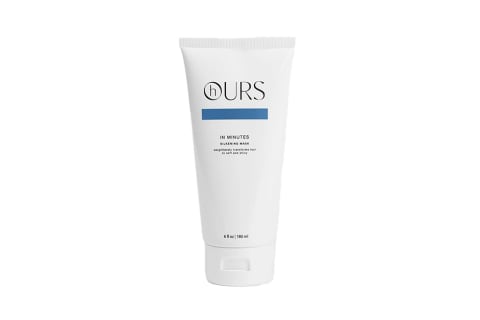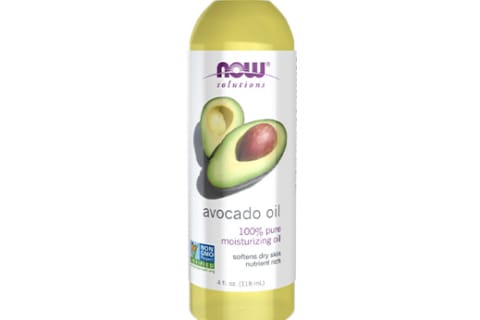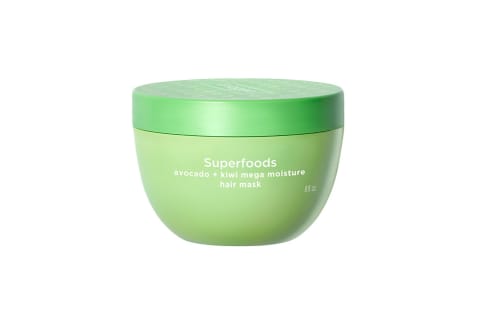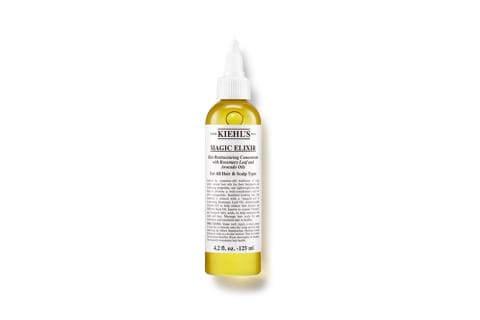Advertisement
Avocado Oil For Hair: 6 Benefits & How To Use It In Your Routine


Shiny hair is understandably desirable. However, there’s not a way to fake highly reflective strands, given that shiny hair is synonymous with healthy hair. Still, there are steps you can take to encourage stronger, more hydrated hair—one of which is oiling your hair.
A common hair oil used for boosting shine and strengthening strands is avocado oil. To come, experts explain why this oil is so beneficial and how to use it.
Hair benefits of avocado oil
Before we dive into the how-to methods, let’s chat about why you should use this ingredient in the first place. Below, a few noteworthy benefits—we explain more in detail below, but as an overview here's what you can expect from using avocado oil.
- Hydrates and conditions
- Reduces breakage and split ends
- Encourages growth
- Hydrates the scalp
- Reduces frizz and improves shine
- Antioxidant protection
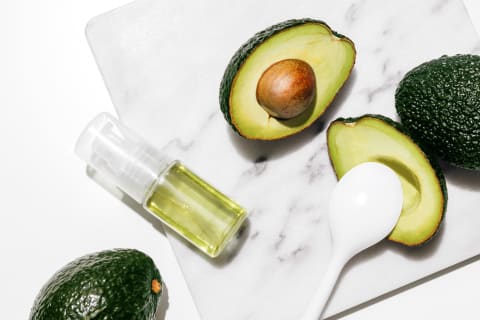
Hydrates and conditions
The rich fatty acid content in avocado oil makes it a wonderful hydrator. "Avocado oil is extremely rich in oleic acid and monounsaturated fats, making it one of few oils that can actually penetrate the hair shaft and moisturize your hair, rather than sitting on top and coating your hair," hair expert and founder of NaturAll Club Muhga Eltigani tells mbg.
This is why avocado oil is a common ingredient in conditioners as well as leave-in products—it has the ability to soak into the hair, meaning a five minute hair mask with avocado oil will actually help your hair in the long run, rather than simply rinsing off.
Reduces breakage and split ends
Apart from momentary hydration, avocado oil also helps prevent breakage. Here’s how: First, avocado oil hydrates your strands and seals the cuticle shut1. You may have open hair cuticles from hair dye, heat damage, UV exposure, dryness, etc.
“When your cuticle is open, not only is your hair susceptible to breakage but it will also appear dry and brittle—you know, that ‘I need a haircut’ feel on your ends,” professional hairstylist and founder of hOURS Haircare Marilynne Cosmillo tells mbg.
Not to mention, applying avocado oil straight to your ends may help you mask the appearance of splits, while preventing worsening breakage at the same time.
Encourages growth
“Natural emollient, avocado oil is rich in vitamins, nutrients and biotin which is synonymous with supporting hair growth,” trichologist and founder of Colour Collective Kerry Yates tells mbg.
The reason for this is two-fold: First, avocado oil helps to strengthen and hydrate your hair, meaning it’ll continue gaining length without breaking off early. What’s more, using avocado on the scalp can help nourish that skin, creating a healthy environment for growth.
Hydrates the scalp
When applied to the scalp, avocado acts as a natural hydrator. Instead of applying loads of avocado oil to the scalp, use this ingredient in a pre-formulated scalp serum or stick with a few drops on your fingertips when you massage.
If you overdo it (read: load oil onto your scalp), you’ll run the risk of clogging follicles which can do the opposite for hair growth.
While this hydrating ingredient can be nourishing for the scalp when used in moderation, you can’t compare avocado oil’s function on the scalp with ingredients like rosemary oil that have been proven to stimulate hair growth at the follicular level.
Reduces frizz and improves shine
“Avocado oil helps to smooth the cuticle down to create instant light reflection even for the most damaged of hair,” Yates explains. When your cuticle is flat, you’ll also experience less frizz and flyaways.
What’s more, Yates notes avocado oil as “A great alternative to silicones which can be too heavy and create an impenetrable barrier which can impact hair health.”
Antioxidant protection
Antioxidants are more commonly discussed in the skin care space, but your hair needs protection from free radicals, too. "As an excellent source of antioxidants like vitamin E, avocado oil can help deal with free radicals generated by environmental damage like UV rays and air pollution," says board-certified dermatologist Keira Barr, M.D.
For lasting antioxidant protection, use a leave in conditioner or hair oil with avocado oil for consistent defense.
The best ways to use avocado oil for hair
Now that you know why avocado oil is so great for your strands, let’s dive into the many different ways to use it in your hair care routine.
- Pre-shampoo oil: If you notice your hair coming out dry post-wash routine, try oiling your strands before you shower. This will help mitigate some of the dryness from your shampoo.
- Nighttime mask: Hair oiling, recently also referred to as “hair slugging” is another way to boost moisture in your hair. To practice this method, take a few drops of avocado oil and massage it into your scalp with your fingertips. Then, lightly coat your strands with the oil and braid your hair or put it in a different protective style. Sleep with the oil in or leave it in for a few hours before rinsing it out.
- Split end mender: For those with frizzy split ends, avocado oil can be a holy grail masking product. Use pure avocado oil (or whatever hair oil you prefer) and apply a few drops to the end of your hair to smooth splits.
- Styler: As with many hydrating oils, you can use avocado oil before or after heat styling to encourage smoother strands and a frizz-free finish. Even if you don’t use hot tools, a few drops of avocado oil on your natural hair can boost shine and soften the strands. Or, use avocado oil to slick back your hair without crunchy, damaging gel.
- Soften crunchy curls: For anyone who uses gel or mousse to enhance their curl shape, avocado oil can help to release that sticky residue. Simply scrunch the avocado oil into your hair after styling and diffusing for a quick softener.
DIY avocado oil hair care products
While you can certainly find avocado oil in pre-formulated masks, leave-ins, and hair oils, you can also make your own recipe. Below, a few ideas.
Avocado + rosemary hair growth scalp oil
Avocado oil is a great carrier oil to host the more potent rosemary oil. Rather than applying the latter to your scalp directly, add a few drops to your avocado oil.
Why rosemary? Well, this herb is known for stimulating circulation on the scalp—which, in turn, has the potential to spur hair growth. In fact, a 2015 randomized comparative trial found that rosemary essential oil was just as effective22 as minoxidil (the active ingredient in many commercial hair-growth products) for reversing hair loss caused by androgens—also known as male- or female-pattern baldness—after six months.
- Get your applicator & fill: Fill up a squirt bottle (perhaps reuse an empty bottle) with avocado oil.
- Add rosemary: Depending on the size of your bottle, you’ll want to add anywhere from 15-30 drops of rosemary oil. This isn’t an exact science, but just be sure to have significantly more avocado oil than rosemary oil in your container.
- Apply: Apply the oil to your scalp (only a few drops of the mixture) and massage it in with your fingertips.
- Let it set: You can let the oil set overnight or rinse it out after an hour or so.
Avocado oil hair mask for damage
If leave-in treatments just aren’t your thing, opt for a hair mask that can be done in the shower. The first option is to add a squirt of conditioner to your palm and add avocado oil to the mix, apply to your strands, and let it set for five minutes before rinsing. Or, make your own mask.
- Find a base: For the base of your hair mask, you can use shea butter, coconut oil, or another rich plant-based butter.
- Add your oil: Add avocado oil to the base until you get a conditoner-like texture.
- Apply & set: Apply the mask to clean hair in the shower and let it set for five to twenty minutes, depending on your time allotted.
- Pro tip: “Apply a shower cap to let your body heat help with absorption,” Yates says.
Simple hair oil
For no-fuss benefits, stick with avocado as it is and use it on the lengths of your hair.
- Find a pure avocado oil: Look for a pure formula without loads of fillers and additives.
- Apply & set: “Apply oil directly after a shower and leave on overnight,” Yates says. Depending on your styling routine you may choose to apply the oil to wet strands or dry strands—either way, your hair will look shinier by morning.
Best products with avocado oil
Hair type considerations
All hair types can benefit from using avocado oil within their products, Cosmillo says, but some hair types should use it just as is for the healing properties. “Using avocado oil straight from the bottle is beneficial for those with dry or damaged hair,” Cosmillo says.
If you have oily roots, skip the scalp leave-ins and oil-based masks and just apply avocado oil to your strands. “For super fine hair, I would use avocado oil on ends predominately and use it sparingly or as needed for extra hair conditioning benefits,” Yates adds.
Cautions and side effects
Like any plant-based ingredient, you should patch test this ingredient before applying it everywhere. For anyone allergic to avocado in general, skip this ingredient for topical use and opt for jojoba oil, grapeseed oil, or argan oil instead.
FAQ
Is it good to put avocado oil in your hair?
Avocado oil is extremely beneficial for the hair. The rich fatty acid content in avocado oil makes it a wonderful hydrator. "Avocado oil is extremely rich in oleic acid and monounsaturated fats, making it one of few oils that can actually penetrate the hair shaft and moisturize your hair, rather than sitting on top and coating your hair," hair expert and founder of NaturAll Club Muhga Eltigani tells mbg.
How long do you leave avocado oil in hair?
“Apply avocado oil directly after a shower and leave on overnight,” Yates says. Depending on your styling routine you may choose to apply the oil to wet strands or dry strands—either way, your hair will look shinier by morning.
Do you put avocado oil in wet or dry hair?
You can apply avocado oil to the hair wet or dry, depending on your preference. Wet hair will absorb the avocado oil deeper, but dry hair will benefit from the frizz-fighting benefit of avocado oil.
Is avocado oil better than coconut oil for hair?
Both avocado and coconut oil are great for hair, but avocado oil is lighter weight and may be absorbed better than coconut oil. "Avocado oil is extremely rich in oleic acid and monounsaturated fats, making it one of few oils that can actually penetrate the hair shaft and moisturize your hair, rather than sitting on top and coating your hair," hair expert and founder of NaturAll Club Muhga Eltigani tells mbg.
The takeaway
If you want shiny hair, consider avocado oil a great sidekick to your mission. Use this ingredient on it’s own as a simple hair oil, mix it into your conditioner, or massage it into your scalp before showering. For more shiny hair tips, check out this story.
